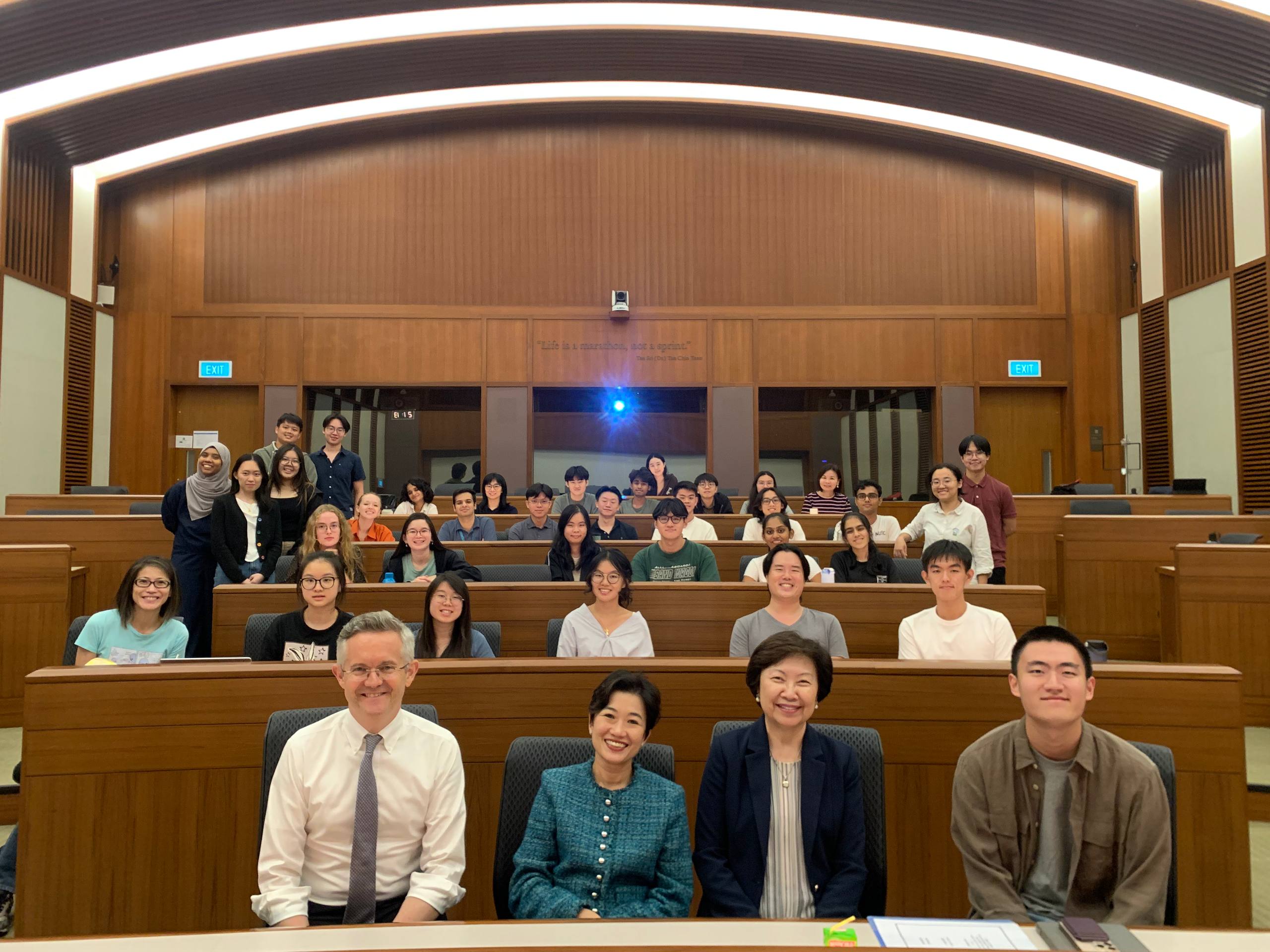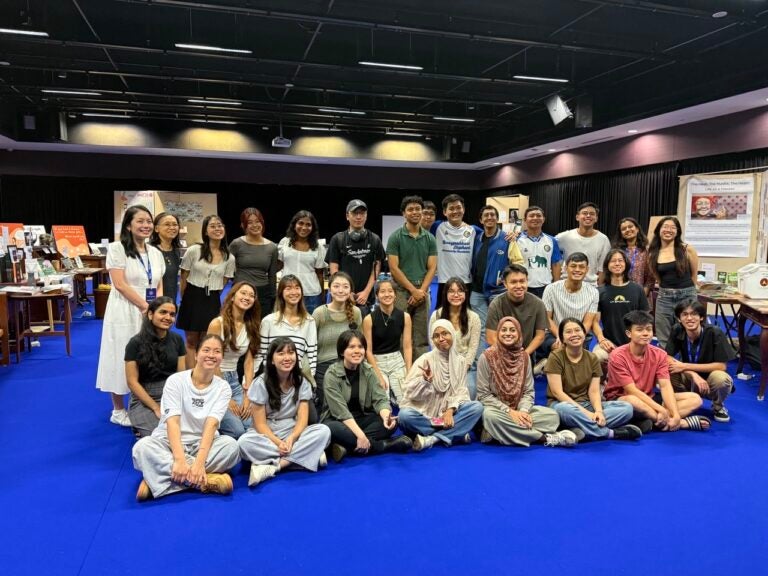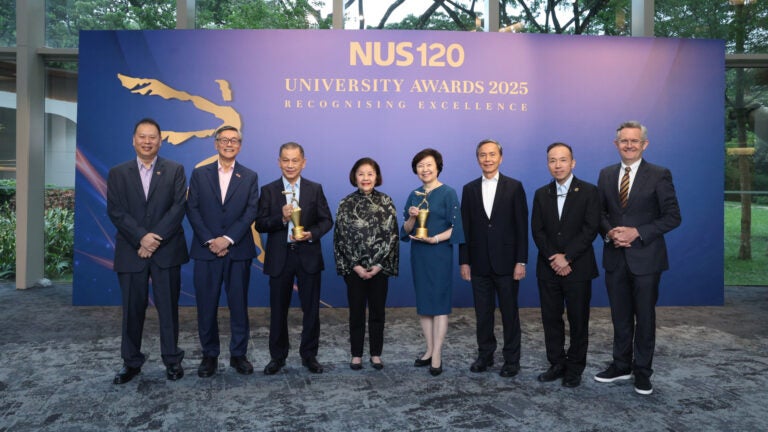By Ishani Anirudh Patil (Political Science + NUSC’25).
 First row (from left to right): NUSC Dean Prof Simon Chesterman; CEO of JTC Corporation Ms Jacqueline Poh; NUSC Rector Prof Cheong Koon Hean; NUSCC President He Yiyang.
First row (from left to right): NUSC Dean Prof Simon Chesterman; CEO of JTC Corporation Ms Jacqueline Poh; NUSC Rector Prof Cheong Koon Hean; NUSCC President He Yiyang.
NUS College had the privilege of hosting Ms Jacqueline Poh, Chief Executive Officer of JTC Corporation, Singapore’s leading developer and manager of quality industrial facilities. Her impressive career has spanned key leadership roles across Singapore’s public sector. She previously served as Managing Director of the Economic Development Board (EDB) and Deputy Secretary in the Prime Minister’s Office Strategy Group. Earlier in her career, she was the founding Chief Executive of the Government Technology Agency of Singapore (GovTech) and Managing Director of the former Infocomm Development Authority (IDA). She has also held leadership positions at the Ministries of Manpower, Finance, and Defence, which positioned her perfectly to guide our discussion on Singapore’s economy.
Why this topic? And, why now?
Professor Cheong Koon Hean, Rector of NUS College, opened the session by expressing her hope that it would offer students perspectives beyond their day-to-day curriculum. She challenged the audience to broaden their worldview and look beyond Singapore’s borders. “There is a much larger world out there to which you can make a great contribution to”, and that such sessions allow students to engage with experts from different industries and broaden the way they see the world.
 Ms Jacqueline Poh addressing NUS College students on Singapore’s economic evolution and career opportunities.
Ms Jacqueline Poh addressing NUS College students on Singapore’s economic evolution and career opportunities.
Singapore’s Economic Evolution
Ms Poh began by providing a detailed historical overview of Singapore’s economy and its many phases. “It’s easy to look around, to imagine that everything that we see today has always been there”, she noted. “But that hasn’t always been the case”. She reminded us of the massive transformation Singapore has undergone — from a labour-intensive economy where wages were once as low as 11 cents an hour, even lower than in Malaysia, to the innovation powerhouse we see today.
She traced the key phases of Singapore’s economic journey, highlighting how the nation progressed from a labour-intensive economy to one driven by knowledge, innovation, and global impact.
How did we come this far?
Jacqueline highlighted three key factors behind Singapore’s progress. First, our “strategic location and connectivity should not be underestimated,” she stressed. This advantage has enabled bold investments like Changi Airport’s upcoming Terminal 5. Second, the nation’s political stability, which gives Singapore the long-term certainty to pursue ambitious reforms. And third, a diversified economy with strong exports and active industrial policy, which has built resilience and created opportunities for growth.
The Challenges Ahead
Yet even with its remarkable progress, Singapore cannot take the road ahead for granted. Rising protectionism and geopolitical tensions are reshaping global trade and weakening international norms. In such a climate, Singapore will need creativity, determination, and innovation to stay relevant and safeguard its place in the world.
This is where Jacqueline’s GUTC framework — Growing, Unlocking, Transforming, and Connecting — comes into play. She spoke about the need to keep pushing for growth beyond past achievements, to unlock resource constraints through creative solutions like energy imports and smarter land use, to help businesses (especially SMEs) transform with technologies like AI and automation, and to strengthen Singapore’s role as a trusted global connector.
Career Planning in an Uncertain Future
Ms Poh encouraged students to ask themselves two simple questions when thinking about their future careers: Is it in a high-growth area? And does it meet the three T’s?
For “no-regret” choices, she pointed to sectors like advanced manufacturing — “think about how much more we can automate manufacturing, robots and AI for digital twins in all our creations!” — as well as the green and digital economies, both of which will only grow in importance.
The three T’s are sectors that will always hold value, no matter how technology evolves: high touch jobs that rely on human connection (from stand-up comedians to personal trainers — even dog walkers!), high tech roles like AI researchers, and high trust professions such as therapists and legal experts.
Discussion with the Students
Jacqueline’s talk sparked a lively discussion with the audience. One attendee brought up the famous line “culture eats strategy for breakfast,” asking which aspects of Singapore’s past might come back to challenge us. Ms Poh responded that nation-building and culture-building are firmly interlinked — pointing out that many of Singapore’s policies like National Service and HDB quotas, are deeply embedded in our culture.
Another student asked if Singapore should be worried about the United States’ new, hardline stance on climate change. Ms Poh was reassuring: “The rest of the world is still moving ahead with climate initiatives, and the trajectory of sustainability will continue.”
Our Takeaway
“Singapore sits on a bed of financial resources that it never had before”, Jaqueline concluded. “This is a huge blessing that should be invested, and not squandered”. Hopefully, the lessons we take away from her session will help us do just that.
As undergraduate students, soon to enter the workforce and experience the complexities of Singapore’s economy for ourselves, this session was deeply valuable to our goals of contributing towards future growth.

